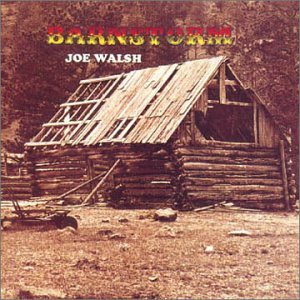
- Format: MP3

Barnstorm, Joe Walsh's first solo album after leaving the James Gang, garnered him fame not only as a guitarist but also as a songwriter. While it's true that Walsh established himself as a late-'60s/early-'70s guitar hero on the Gang's more boogie-oriented rock numbers, it's Walsh's love of lushly textured production and spacy, open-ended songs featuring both acoustic and electric guitars that is showcased here on this wildly adventurous and forgotten unqualified masterpiece. Recorded at the Caribou Ranch in Nederland, CO, Barnstorm reflects the big sky and wide open spaces. Accompanied by bassist Kenny Passarelli and drummer Joe Vitale, Walsh freely indulges himself with fat guitars and keyboards, beautiful choruses, country tinges, and pastoral pop hooks, as evidenced by the glorious opener, "Here We Go." This segues, via the sound of a spooky lonesome wind, into the hauntingly beautiful psychedelic country tune "Midnight Visitor," with elegantly woven acoustic guitars, fat carnival organ sounds, and — of course — the sound of the wind before it slips out the back door. And so it goes with the nearly Baroque psychedelic suite of "One and One," which slides seamlessly into "Giant Bohemoth" (sic) and the rollicking "Mother Says." Everywhere on the album's front half, reverie and American mythological archetypes and history weave together, displacing the listener from the here and now. The openly pastoral country-tinged rock of the album's second half signifies Walsh's considerable gifts as a songwriter who uses his guitar as a dreamy, mercurial narrative device, as signified by the masterpiece "Birdcall Morning" — one of the greatest rock & roll love songs of the early '70s. It is actually mirrored by the sadness and organic bluesy quality of "Home" and the unabashed pop/rock romanticism of "I'll Tell the World," complete with glorious four-part backing harmonies and a crunching guitar crescendo. Speaking of crunch, Barnstorm was also the first place that Walsh's classic "Turn to Stone" nugget ever appeared. In its original version, its guitars have far more edge, sinew, and raw power than on its subsequent re-recording. Rather than let it end there, Walsh tips the scales one more time back to the mysterious in the acoustic guitar and harmonica moment "Comin' Down." It's another love song, which evokes the notion of the past as a way of creating a hopeful present. And it just whispers to a close, leaving the listener literally stunned at what has just transpired in the space of 35 minutes.